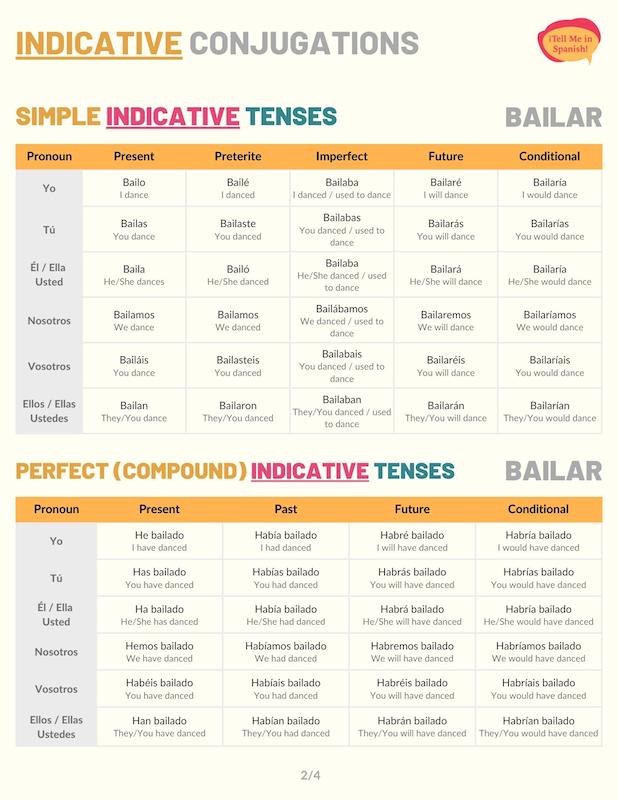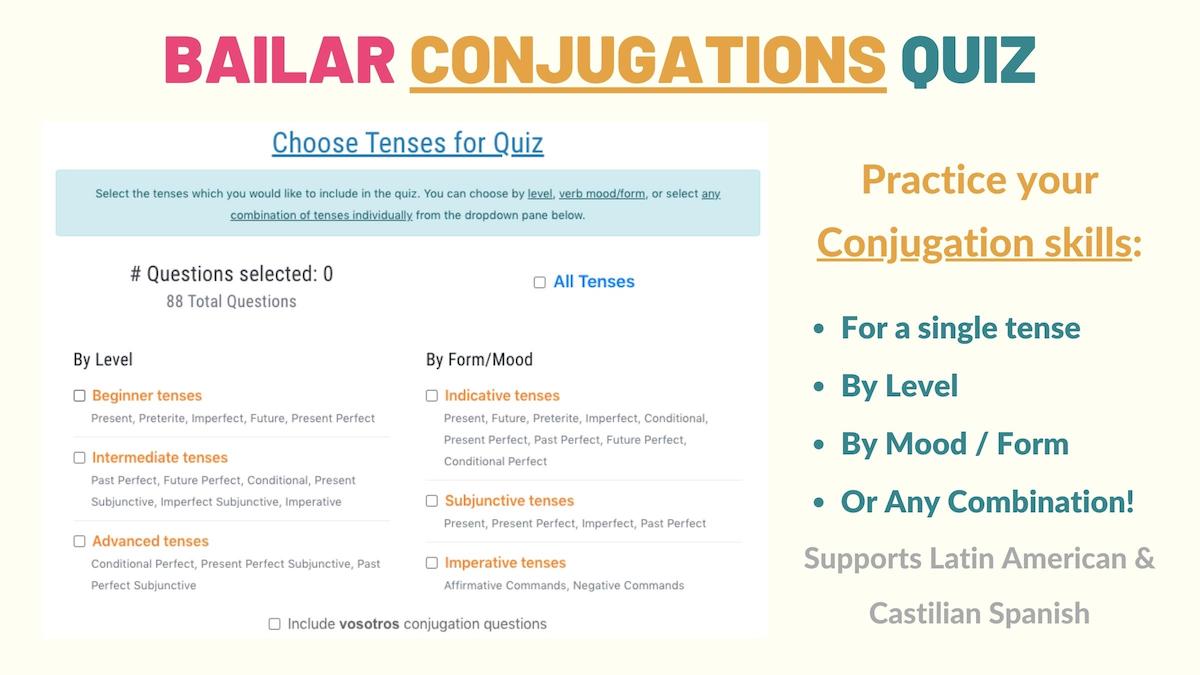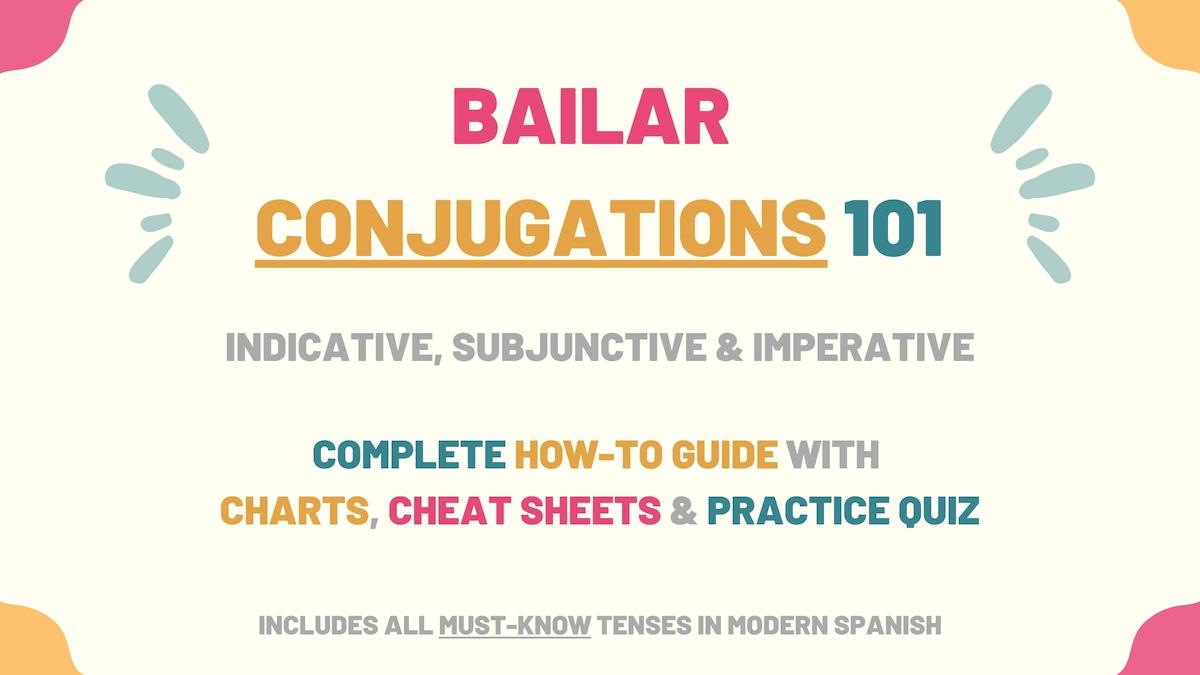Bailar is a regular -AR verb in Spanish. Since it’s a simple verb which can help you practice this conjugation type, in this guide, we’ll review all of the bailar conjugation patterns you need to learn and become fluent in modern Spanish. Here is a summary of what we’ll cover:
- Bailar Overview
- Indicative Tenses of Bailar Conjugations
- Subjunctive Tenses of Bailar Conjugations
- Imperative (Commands) of Bailar Conjugations
- Uses & Examples
- Download Bailar Conjugation Tables & Uses Cheat sheets
- Bailar Conjugation Practice Quiz
Overview of Bailar
| Verb Characteristic | Property |
|---|---|
| Verb Type | -AR |
| Irregular | No |
| Infinitive | Bailar |
| Gerund (Present Participle) Form | Bailando |
| Past Participle Form | Bailado |
| Synonyms | Danzar, moverse. |
Indicative Conjugations of Bailar
Present tense
The present forms of bailar are used to say that a person dances or describes how someone performs this activity. For example: Mis amigas bailan muy bien.
| Person | Conjugation | Translation |
|---|---|---|
| Yo | Bailo | I dance |
| Tú | Bailas | You dance |
| Él / Ella Usted | Baila | He/She dances You (formal) dance |
| Nosotros | Bailamos | We dance |
| Vosotros | Bailáis | You dance |
| Ellos / Ellas Ustedes | Bailan | They dance You (plural) dance |
Preterite tense
Use bailar preterite conjugations to mention that someone danced. You can add adverbs of time to your sentence to pinpoint exactly when someone did this activity. For example: Theo bailó conmigo en la fiesta.
| Person | Conjugation | Translation |
|---|---|---|
| Yo | Bailé | I danced |
| Tú | Bailaste | You danced |
| Él / Ella Usted | Bailó | He/She danced You (formal) danced |
| Nosotros | Bailamos | We danced |
| Vosotros | Bailasteis | You danced |
| Ellos / Ellas Ustedes | Bailaron | They danced You (plural) danced |
Imperfect tense
When conjugated to the past imperfect tense in Spanish, this verb is used to say that a person used to dance for an extended period of time. These forms also allow you to describe how well someone used to do this activity. For instance: Mi papá nunca bailaba en las fiestas.
| Person | Conjugation | Translation |
|---|---|---|
| Yo | Bailaba | I danced I used to dance |
| Tú | Bailabas | You danced You used to dance |
| Él / Ella Usted | Bailaba | He/She danced He/She used to dance You (formal) danced You (formal) used to dance |
| Nosotros | Bailábamos | We danced We used to dance |
| Vosotros | Bailabais | You danced You used to dance |
| Ellos / Ellas Ustedes | Bailaban | They danced They used to dance You (plural) danced You (plural) used to dance |
Near future
The Spanish immediate or near future of this verb is built with the formula ir (present tense) + bailar. These conjugations express that someone will dance soon in the future. ¡Ándale! ¡Vamos a bailar!
| Person | Conjugation | Translation |
|---|---|---|
| Yo | Voy a bailar | I’m going to dance |
| Tú | Vas a bailar | You’re going to dance |
| Él / Ella Usted | Va a bailar | He/She is going to dance You (formal) are going to dance |
| Nosotros | Vamos a bailar | We’re going to dance |
| Vosotros | Vais a bailar | You’re going to dance |
| Ellos / Ellas Ustedes | Van a bailar | They’re going to dance You (plural) are going to dance |
Future simple tense
Conjugate bailar to the future simple tense to say that someone will dance at some moment in the future. For instance: ¿Con quién bailarán esta noche?
| Person | Conjugation | Translation |
|---|---|---|
| Yo | Bailaré | I will dance |
| Tú | Bailarás | You will dance |
| Él / Ella Usted | Bailará | He/She will dance You (formal) will dance |
| Nosotros | Bailaremos | We will dance |
| Vosotros | Bailaréis | You (formal) will dance |
| Ellos / Ellas Ustedes | Bailarán | They will dance You (plural) will dance |
Conditional tense
Bailar’s conditional conjugations allow you to express that a person would dance. You can use these forms to ask someone politely to dance with you. ¿Bailarías conmigo?
| Person | Conjugation | Translation |
|---|---|---|
| Yo | Bailaría | I would dance |
| Tú | Bailarías | You would dance |
| Él / Ella Usted | Bailaría | He/She would dance You (formal) would dance |
| Nosotros | Bailaríamos | We would dance |
| Vosotros | Bailaríais | You would dance |
| Ellos / Ellas Ustedes | Bailarían | They would dance You (plural) would dance |
Present perfect tense
The Spanish present perfect of bailar is formed with haber (present tense) + bailado (past participle). Use these conjugations to talk about whether a person has danced or not. For example: ¿Con quién has bailado?
| Person | Conjugation | Translation |
|---|---|---|
| Yo | He bailado | I have danced |
| Tú | Has bailado | You have danced |
| Él / Ella Usted | Ha bailado | He/She has danced You (formal) have danced |
| Nosotros | Hemos bailado | We have danced |
| Vosotros | Habéis bailado | You have danced |
| Ellos / Ellas Ustedes | Han bailado | They have danced You (plural) have danced |
Past perfect
Bailar past perfect tense conjugations are used to communicate that someone had or hadn’t danced before another past action or reference point. For instance: Cuando llegué, Sabina ya había bailado con Humberto.
To conjugate to the past perfect tense, use the structure haber (imperfect form) + bailado (bailar in the past participle form).
| Person | Conjugation | Translation |
|---|---|---|
| Yo | Había bailado | I had danced |
| Tú | Habías bailado | You had danced |
| Él / Ella Usted | Había bailado | He/She had danced You (formal) had danced |
| Nosotros | Habíamos bailado | We had danced |
| Vosotros | Habíais bailado | You had danced |
| Ellos / Ellas Ustedes | Habían bailado | They had danced You (plural) had danced |
Future perfect
Conjugate this verb to future perfect tense to communicate that someone will have danced by or before a point in the future. These conjugations also express that someone might have danced. For instance: Cuando llegamos, ya habrán bailado su canción de bodas.
| Person | Conjugation | Translation |
|---|---|---|
| Yo | Habré bailado | I will have danced |
| Tú | Habrás bailado | You will have danced |
| Él / Ella Usted | Habrá bailado | He/She will have danced You (formal) will have danced |
| Nosotros | Habremos bailado | We will have danced |
| Vosotros | Habréis bailado | You will have danced |
| Ellos / Ellas Ustedes | Habrán bailado | They will have danced You (plural) will have danced |
Conditional perfect
Use bailar in the conditional perfect tense to explain that someone would have danced if a past circumstance occurred. Si me lo hubieras pedido, habría bailado contigo toda la noche.
| Person | Conjugation | Translation |
|---|---|---|
| Yo | Habría bailado | I would have danced |
| Tú | Habrías bailado | You would have danced |
| Él / Ella Usted | Habría bailado | He/She would have danced You (formal) would have danced |
| Nosotros | Habríamos bailado | We would have danced |
| Vosotros | Habríais bailado | You would have danced |
| Ellos / Ellas Ustedes | Habrían bailado | They would have danced You (plural) would have danced |
Progressive tenses
Use estar’s conjugations + bailando (present participle form) to form the progressive tenses in Spanish. These conjugations of bailar emphasize that someone is dancing at the moment of speaking. For example: ¿Con quién está bailando Samantha?
| Progressive Tense | Formula | Translation Example |
|---|---|---|
| Present | Estar (present) + bailando | I am dancing |
| Preterite | Estar (preterite) + bailando | You were dancing |
| Imperfect | Estar (imperfect) + bailando | He was dancing |
| Future | Estar (future) + bailando | We will be dancing |
| Conditional | Estar (conditional) + bailando | They would be dancing |
Bailar Subjunctive Conjugations
The subjunctive mood in Spanish allows you to talk about someone’s hopes, demands, recommendations, expectations, and doubts or to refer to hypothetical situations. In the sections below, you’ll find the bailar conjugation charts for the key subjunctive tenses.
Present subjunctive
The present subjunctive conjugations of bailar are used to wish, suggest, or ask a person to dance with someone. For example: Espero que Sharon baile conmigo.
| Person | Conjugation | Translation |
|---|---|---|
| Yo | Baile | I dance |
| Tú | Bailes | You dance |
| Él / Ella Usted | Baile | He/She dance You (formal) dance |
| Nosotros | Bailemos | We dance |
| Vosotros | Bailéis | You dance |
| Ellos / Ellas Ustedes | Bailen | They dance You (plural) dance |
Present perfect subjunctive
Haber (present subjunctive) + bailado is used to conjugate the present perfect subjunctive in Spanish. In this tense, this verb expresses uncertainty or refers to wishes about whether a person has danced with someone.
For example: No sé con quien haya bailado, pero conmigo no fue.
| Person | Conjugation | Translation |
|---|---|---|
| Yo | Haya bailado | I have danced |
| Tú | Hayas bailado | You have danced |
| Él / Ella Usted | Haya bailado | He/She has danced You (formal) have danced |
| Nosotros | Hayamos bailado | We have danced |
| Vosotros | Hayáis bailado | You have danced |
| Ellos / Ellas Ustedes | Hayan bailado | They have danced You (plural) have danced |
Imperfect subjunctive
The imperfect subjunctive forms of bailar refers to past demands, suggestions, or expectations you had about someone dancing. For instance: Te dije que no bailaras con ese chico.
Depending on the Spanish dialect you learn, the imperfect subjunctive has two conjugation models:
Latin American Spanish version
| Person | Conjugation | Translation |
|---|---|---|
| Yo | Bailara | I danced |
| Tú | Bailaras | You danced |
| Él / Ella Usted | Bailara | He/She danced You (formal) danced |
| Nosotros | Bailáramos | We danced |
| Ellos / Ellas Ustedes | Bailaran | They danced You (plural) danced |
Note: Since vosotros is not used in Latin American Spanish, the bailar conjugation chart above doesn’t include this conjugation.
Castilian Spanish version
| Person | Conjugation | Translation |
|---|---|---|
| Yo | Bailase | I danced |
| Tú | Bailases | You danced |
| Él / Ella Usted | Bailase | He/She danced You (formal) danced |
| Nosotros | Bailásemos | We danced |
| Vosotros | Bailaseis | You danced |
| Ellos / Ellas Ustedes | Bailasen | They danced You (plural) danced |
Past perfect subjunctive
Bailar conjugated to the past perfect subjunctive tense expresses that someone would have danced if a past condition took place. This tense also allows you to show regret for dancing or not dancing with someone. For example: Ojalá hubiéramos bailado.
| Person | Conjugation | Translation |
|---|---|---|
| Yo | Hubiera bailado | I had danced |
| Tú | Hubieras bailado | You had danced |
| Él / Ella Usted | Hubiera bailado | He/She had danced You (formal) had danced |
| Nosotros | Hubiéramos bailado | We had danced |
| Vosotros | Hubierais bailado | You had danced |
| Ellos / Ellas Ustedes | Hubieran bailado | They had danced You (plural) had danced |
Bailar Imperative Conjugations
To give commands in Spanish, use a verb’s imperative forms. Affirmative commands allow you to order people to do something, whereas the negative imperative is used to tell people not to do something.
Affirmative commands
Use the affirmative imperative forms of bailar to order someone to dance. For instance: Baila con tu primo, no seas grosera.
| Person | Conjugation | Translation |
|---|---|---|
| Tú | Baila | Dance |
| Usted | Baile | Dance |
| Vosotros | Bailad | Dance |
| Ustedes | Bailen | Dance |
Negative commands
To order someone not to dance, conjugate bailar to the negative imperative. For example: ¡No bailes con esa chica!
| Person | Conjugation | Translation |
|---|---|---|
| Tú | No bailes | Don’t dance |
| Usted | No baile | Don’t dance |
| Vosotros | No bailéis | Don’t dance |
| Ustedes | No bailen | Don’t dance |
Meanings of Bailar & Examples
In the sections above, we just learned how to conjugate bailar in Spanish. Now, let’s review how to use this verb correctly.
[Bailar conjugated] + [complement]
¿Vas a bailar con mi hermana?
Are you going to dance with my sister?
Tanya y su novio bailaron toda la noche.
Tanya and her boyfriend danced all night.
Take Note: Use the preposition con and prepositional pronouns to mention with whom someone is dancing.
Download Bailar Conjugation Charts & Uses Cheat sheets

I’ve created a Bailar cheat sheets PDF you can download for free which includes all of the bailar conjugation charts as well as its definition and uses so you can study this verb and related resources at your own pace.
Practice Quiz: Bailar Conjugation

Now that you can conjugate bailar, you can practice your skills with regular -AR verbs by taking the bailar conjugation practice quiz.



